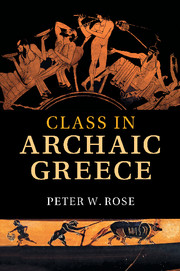Refine search
Actions for selected content:
23990 results in Ancient history
Contents
-
- Book:
- Gnostic Religion in Antiquity
- Published online:
- 05 February 2013
- Print publication:
- 24 January 2013, pp v-vi
-
- Chapter
- Export citation
Chapter 4 - Anti-gnostic literature
-
- Book:
- Gnostic Religion in Antiquity
- Published online:
- 05 February 2013
- Print publication:
- 24 January 2013, pp 126-135
-
- Chapter
- Export citation
Index of ancient sources
-
- Book:
- Gnostic Religion in Antiquity
- Published online:
- 05 February 2013
- Print publication:
- 24 January 2013, pp 248-252
-
- Chapter
- Export citation
Chapter 2 - Gnostic literature I:
-
- Book:
- Gnostic Religion in Antiquity
- Published online:
- 05 February 2013
- Print publication:
- 24 January 2013, pp 13-24
-
- Chapter
- Export citation
Abbreviations
-
- Book:
- Gnostic Religion in Antiquity
- Published online:
- 05 February 2013
- Print publication:
- 24 January 2013, pp viii-x
-
- Chapter
- Export citation
Chapter 1 - Gnosis and gnostic religion
-
- Book:
- Gnostic Religion in Antiquity
- Published online:
- 05 February 2013
- Print publication:
- 24 January 2013, pp 1-12
-
- Chapter
- Export citation
Chapter 5 - Gnosis:
-
- Book:
- Gnostic Religion in Antiquity
- Published online:
- 05 February 2013
- Print publication:
- 24 January 2013, pp 136-205
-
- Chapter
- Export citation
Gnostic Religion in Antiquity - Title page
-
-
- Book:
- Gnostic Religion in Antiquity
- Published online:
- 05 February 2013
- Print publication:
- 24 January 2013, pp iii-iii
-
- Chapter
- Export citation
Bibliography
-
- Book:
- Gnostic Religion in Antiquity
- Published online:
- 05 February 2013
- Print publication:
- 24 January 2013, pp 232-247
-
- Chapter
- Export citation
Chapter 3 - Gnostic literature II:
-
- Book:
- Gnostic Religion in Antiquity
- Published online:
- 05 February 2013
- Print publication:
- 24 January 2013, pp 25-125
-
- Chapter
- Export citation

Class in Archaic Greece
-
- Published online:
- 05 January 2013
- Print publication:
- 28 January 2012
Chapter 3 - The liberty of the commonwealth
-
- Book:
- Libertas and the Practice of Politics in the Late Roman Republic
- Published online:
- 05 February 2013
- Print publication:
- 03 January 2013, pp 73-168
-
- Chapter
- Export citation
Contents
-
- Book:
- Libertas and the Practice of Politics in the Late Roman Republic
- Published online:
- 05 February 2013
- Print publication:
- 03 January 2013, pp v-v
-
- Chapter
- Export citation
Libertas and the Practice of Politics in the Late Roman Republic - Half title page
-
- Book:
- Libertas and the Practice of Politics in the Late Roman Republic
- Published online:
- 05 February 2013
- Print publication:
- 03 January 2013, pp i-ii
-
- Chapter
- Export citation
Introduction
-
- Book:
- Libertas and the Practice of Politics in the Late Roman Republic
- Published online:
- 05 February 2013
- Print publication:
- 03 January 2013, pp 1-13
-
- Chapter
- Export citation
Copyright page
-
- Book:
- Libertas and the Practice of Politics in the Late Roman Republic
- Published online:
- 05 February 2013
- Print publication:
- 03 January 2013, pp iv-iv
-
- Chapter
- Export citation
Index locorum
-
- Book:
- Libertas and the Practice of Politics in the Late Roman Republic
- Published online:
- 05 February 2013
- Print publication:
- 03 January 2013, pp 312-318
-
- Chapter
- Export citation
Chapter 1 - Roman libertas
-
- Book:
- Libertas and the Practice of Politics in the Late Roman Republic
- Published online:
- 05 February 2013
- Print publication:
- 03 January 2013, pp 14-44
-
- Chapter
- Export citation
Acknowledgements
-
- Book:
- Libertas and the Practice of Politics in the Late Roman Republic
- Published online:
- 05 February 2013
- Print publication:
- 03 January 2013, pp vi-viii
-
- Chapter
- Export citation
Chapter 5 - Political response and the need for legitimacy
-
- Book:
- Libertas and the Practice of Politics in the Late Roman Republic
- Published online:
- 05 February 2013
- Print publication:
- 03 January 2013, pp 244-257
-
- Chapter
- Export citation
